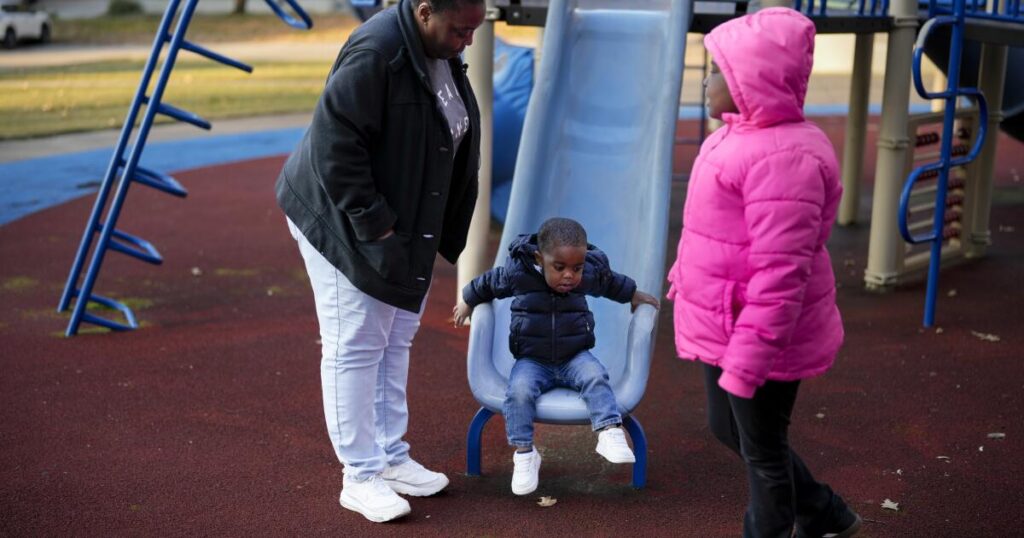MEMPHIS, Tenn. — Taylor Cagnacci moved from California to Tennessee with hopes of starting a new chapter in a state that touts a low cost of living and natural beauty.
But she’s infuriated by Tennessee’s meager social services, which leave her and many other moms struggling in a state where abortion is banned with limited exceptions.
“I was going to have my child no matter what, but for other women, that’s kind of a crappy situation that they put you in,” said Cagnacci, a 29-year-old Kingsport mom who relies on Medicaid and a federally funded nutrition program. “You have to have your child. But where’s the assistance afterward?”
Tennessee has a porous safety net for mothers and young children, recent research and an analysis by the Associated Press found. It’s unknown how many women in the state have given birth because they didn’t have access to abortion, but it is clear that from the time a Tennessee woman gets pregnant, she faces greater obstacles to a healthy pregnancy, a healthy child and a financially stable family than the average American mom.
Like other states with strict abortion bans, Tennesseans of childbearing age are more likely to live in maternal care deserts and face overall doctor shortages. Women, infants and children are less likely to be enrolled in a government nutrition program known as WIC. And Tennessee is one of only 10 states that hasn’t expanded Medicaid to a greater share of low-income families.
“It’s survival, every day,” said Janie Busbee, founder of Mother to Mother, a Nashville-based nonprofit providing baby supplies for low-income moms. “If we took some of that stress off of them, then maybe they’d have time to dream.”
GOP state leaders in Tennessee and other states that banned abortion after the Supreme Court overturned Roe vs. Wade in 2022 argue that they are bolstering services for families.
Tennessee boosted its Medicaid coverage for mothers in 2022 from 60 days postpartum to a year, which allowed an additional 3,000 moms to use the program each year.
The state also raised the Medicaid income limit for parents to the poverty level — nearly $26,000 for a family of three — and offers recipients 100 free diapers a month for babies under 2. According to the governor’s office, these changes have resulted in thousands of new parents accessing government services.
“Pro-life is much more than defending the lives of the unborn,” Republican Gov. Bill Lee said in his 2023 annual address to lawmakers and echoed more recently on social media. “This is not a matter of politics. This is about human dignity.”
Yet, nonprofit leaders and mothers told the AP there are still significant gaps in the safety net.
Anika Chillis, a 39-year-old single mom in Memphis, has Medicaid, WIC and the Supplemental Nutrition Assistance Program (formerly known as food stamps). While she’s deeply grateful for the help, she said it also can disappear — like when she temporarily lost WIC.
“It’s hard,” she said, sitting on a park bench as her 2-year-old son and 9-year-old daughter played nearby. “Groceries are constantly going up.” And being a single mom “makes it doubly hard on you.”
Medicaid and healthcare challenges
Tennessee fared poorly at WIC enrollment, Medicaid, having enough maternal care and requirements for paid family and medical leave, an October study found.
Other states with similarly restrictive abortion laws — such as Idaho, Alabama, Missouri, Georgia and Mississippi — ranked poorly on numerous measures, too. Researchers said restrictive states had a slightly higher average birth rate and a much lower average abortion rate than the least restrictive states.
“In general, these states that restrict abortion are the more fiscally conservative, the more socially conservative states,” said Dr. Nigel Madden, lead author of the study published in the American Journal of Public Health.
Women with young children in states where abortion is banned or limited to early weeks of pregnancy said it can be tough to get social services there, according to a survey by the health policy research organization KFF. Nearly half said it’s difficult for women in their state to get food stamps, for example, compared with 3 in 10 in states where abortion is generally available.
“People who claim to be pro-life, who advocated for these abortion bans, often suggest that these policies are designed to protect children, women and families,” said Madden, the researcher. But the weakness of the safety net shows “the hypocrisy of that argument.”
Tennessee’s new diaper program shows the deep political divisions surrounding aid programs. The Republican governor described it as an effort to strengthen families while Democratic state Sen. London Lamar said GOP leaders are “trying to put a little bow on an abortion ban.” And GOP state Sen. Mark Pody recently told the right-leaning news website Tennessee Conservative that “it is not the state’s responsibility to have a diaper for every single baby” and floated the possibility of cutting the program.
Ungar and Kruesi write for the Associated Press. Kruesi reported from Nashville, Tenn. AP data journalists Kasturi Pananjady and Nicky Forster contributed to this report. The Associated Press Health and Science Department receives support from the Howard Hughes Medical Institute’s Science and Educational Media Group and the Robert Wood Johnson Foundation. The AP is solely responsible for all content.







